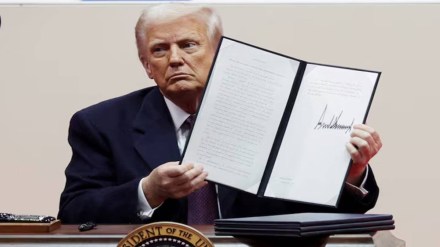In response to former President Donald Trump‘s executive order aimed at restricting birthright citizenship, a coalition of Democratic-led states and civil rights groups have filed lawsuits to block the directive. The lawsuits were filed shortly after Trump’s inauguration and his subsequent directive, marking the first major legal battle for his administration’s immigration policies.
The executive order mandates that US agencies deny citizenship to children born in the country if neither parent is a U.S. citizen or a legal permanent resident. Critics argue that the directive violates the 14th Amendment of the US Constitution, which guarantees citizenship to anyone born on American soil.
Widespread Legal Opposition
According to a Reuters report, 22 Democratic-led states, along with the districts of San Francisco and Columbia, have filed lawsuits in federal courts in Seattle and Boston. These legal actions claim that the order undermines constitutional protections. Civil rights organizations, an expectant mother, and an immigrant advocacy group have also voiced their opposition.
Massachusetts Attorney General Andrea Joy Campbell emphasized that “President Trump does not have the jurisdiction to take away constitutional rights.” The order, if enacted, would result in over 150,000 children born annually in the U.S. losing citizenship, along with access to lawful employment, voting rights, and federal programs.
The lawsuits are based on the Citizenship Clause of the 14th Amendment and the 1898 US Supreme Court decision in United States v. Wong Kim Ark, which affirmed that children born in the U.S. to non-citizen parents are entitled to U.S. citizenship.
Growing Legal Pushback
Legal opposition to the executive order is expected to grow, with additional lawsuits anticipated against other components of Trump’s immigration agenda. New Jersey Attorney General Matthew also expressed similar concerns, pledging to defend constitutional guarantees.
A hearing is scheduled in Seattle to consider issuing a temporary restraining order against the executive order, while lawsuits are also progressing in Massachusetts, Maryland, and New Hampshire. These cases are expected to undergo appellate review in courts with judges appointed by Democratic administrations.
